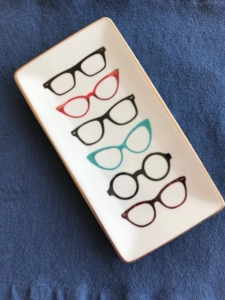Words Fail Me
Middle-Aged and Needing New Words
It’s true as we get older, our memory and communication skills slip a bit. Why did I walk into this room? What did I have for lunch today? What did you just say? And sometimes, frustratingly, we have to search for a word that’s at the tip of our tongue.
Yet, for all that, I believe there’s a bigger problem at play. The English language lacks the vocabulary to address the sensations, situations, and emotions – good and bad, we middle-agers and seniors experience.
For instance, what do you call the transformation of a once patient spouse into a grouchy, short-tempered guy? (A friend wants to know.)
What is the term for the seemingly overnight transference of hair from the top of your head to lower on your face? (Another friend wants to know.)
And what’s the word to describe that specific panicked moment when you realize that if you don’t find a restroom right then and there, you’re going to embarrass yourself and everybody around you? (All my friends need to know.)
Words Fail Me
The underlying causation of all these indignities and injustices may be aging, but still, specific terms to succinctly describe them would be useful. Yet, maddeningly, they just don’t exist in common parlance.
The French have some great words. Here’s one I recently came across – malbouffe, which literally means bad feed, and is used to negatively capture the feeling of eating fast food.
The Germans have it somewhat easy! They just tack together words into bigger words to convey thoughts and ideas. My favorite – Geschwindigkeitsbegrenzung. It’s a is a mouthful and isn’t speedy to say, but ironically it means speed limit.
And in Russia, the people in charge of such things just add Slavic ending to words. For example, when I prepared for my first summer study program in St. Petersburg/then Leningrad in the mid-1970s, my mother was greatly comforted knowing I could correctly conjugate the verb “to be arrested” if the need arose. (transliteration: “byt’ arestovannym”).
Don’t get me wrong. I’m not anti-English. We’ve got some great words. Among my personal favorites – cockles, the ever-popular supercalifragilisticexpialidocious (which I actually spelled correctly without the help of spell-check!), and hamartia, a word I recently came across in a novel. It means “a fatal flaw leading to the downfall of a tragic hero.” I do, however, feel the definition is a bit redundant. Fatal flaws are just that – fatal, and if someone is a hero, of course, that’s tragic.
We Need a Word for This
Yet, where are the precise, non-medical words we middle-aged muddlers and seniors need?
Here are a few more scenarios, images, and emotions that require special terms just for us:
- A word for that unstoppable downward migration of once perky pre-nursing-your-children breasts from the upper third of your chest to close to your middle.
- A term to describe those awful vertical Grand Canyon-like wrinkles that surround your lips and then, adding insult to injury, become even more pronounced when the red lipstick you formerly wore with such sexy pride bleeds into them.
- The word for the horror and shame you feel when you see those vampire red lipstick-ed wrinkled lips in the restroom mirror mid-way through a romantic dinner date with your spouse.
And, to bring balance to our dictionary – and the true story of aging – we also need terms to address the positive side of our journey. Terms for:
- That moment you realize you no longer are required to cook Thanksgiving dinner for 37 people.
- The joy of not buying feminine hygiene products anymore and being embarrassed at the supermarket checkout line.
- The bliss you feel when your husband sweetly and sincerely tells you, “You’re as cute as the day we met.”
Help Me Here!
What do you say, my dear muddlers? Any suggestions for words for these definitions? What feelings and phases do you feel we need special words for? Please make this a conversation. Comment below or on Facebook.
And let’s make it a contest. Whoever submits the best suggestion wins a ceramic trinket tray. The tray features an array of eyeglasses similar to the Muddling through Middle Age banner! It’s cute and it’s handy.








I find that in a pinch the Yiddish word “OY” comes to mind. In the split second that my brain can’t think of anything better to utter…it just rolls off the tongue….and pretty much conveys the feeling I’m trying to express….
Great piece. I love making up new words. I might have to give this a go. Like rushing to the bathroom because you are “bladdered” or calling my husband a “creezer”. A cross between a crank and geezer. Have fun with this one.
Let the competition begin!
For #2, sanopause?
Clever!
How about “Siritation”? This is the growing, grating feeling of aggression towards my smartphone when Siri, unasked, repeatedly “suggests” that I call or text my son to wish him a “Happy Birthday”… when he’s sitting across the room from me.
Very funny! Thank Goodness, that doesn’t happen to me. (Alexa, you aren’t reading this are you?)
And we have a winner – actually two and they are both named Mary! Congratulations to Mary Rees and Mary Mooney. Thank you for your contributions to the middle-aged lexicon. Your Muddling through Middle Age prizes are on their way!